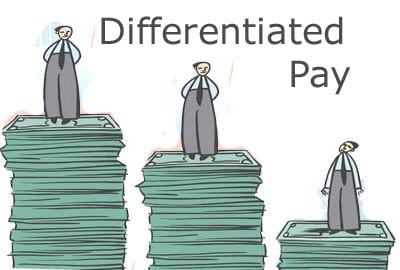

This article was originally published at ncpolicywatch.com
Seventy five of North Carolina’s 115 school districts have submitted teacher compensation proposals to the General Assembly with the hope of participating in a pilot program that would reward highly effective teachers with bonuses.
The pilot, “Differentiated Pay for Highly Effective Teachers,” comes at a time when the state is facing what some say is a crisis when it comes to recruiting and retaining high quality teachers.
North Carolina has fallen near the bottom in national rankings on teacher pay, dramatically fewer students than in previous years are enrolling in teacher training programs, and many of the state’s teachers are fleeing to neighboring states to see as much as a $10,000 increase in pay.
Lawmakers are searching for solutions.
Pay for performance vs. differentiated pay
The differentiated pay pilot, a piece of a strategy that was pushed by Governor Pat McCrory last year as part of his “career pathways plan” to keep teachers in the classroom longer, was enacted during last year’s legislative session in the state budget.
The pilot will be funded by way of a $1 million appropriation to the Education Endowment Fund, a program Lt. Governor Dan Forest introduced at the General Assembly last year and Sen. Jerry Tillman (R-Randolph) endorsed. In addition to the General Assembly’s support, the public can also contribute to the fund by way of purchasing Lt. Gov. Forest’s ‘I Support Teachers’ license plates (more on those here and here) or by making a tax-deductible contribution.
The law encourages local districts to submit teacher pay proposals for the pilot that could look like one of two distinct models: either pitch a plan that would reward teachers on the basis of how well their students do on tests, or present an idea for paying teachers who work in hard to staff subject areas or rural/high poverty schools and/or taking on additional leadership roles to improve student success. The law is unclear on how many school systems will be chosen to participate in the pilot and how much funding they will be awarded for their proposals.
Performance-based pay bumps that are measured solely on the basis of students’ performance on tests didn’t appeal to Pitt County Schools, said Seth Brown, PCS’ Teacher Support Coordinator and an architect of their differentiated pay proposal.
“Research shows performance pay doesn’t work,” said Brown in an interview with N.C. Policy Watch.
Pitt County Schools submitted a very detailed plan to the General Assembly that focuses instead on rewarding teachers for leadership, collaboration, and willingness to work in high needs schools and hard-to-staff subjects.
“It’s essentially a career ladder program,” said Brown. Phased in over time, those who serve as “lead teachers” will be rewarded with a 15 percent pay increase for working collaboratively with their less experienced colleagues to help them learn how to expertly plan and develop good assessment strategies.
Lead teachers could then transition into “model teachers” that would co-teach across multiple classrooms, apprenticing their colleagues in “the art and science of what highly effective instruction looks like.” An additional 15 percent pay increase above the lead teacher salary would be given to model teachers.
Brown said this strategy aims to reduce the exodus of talented teachers who want to expand their influence beyond a classroom of 25 third graders.
“It’s amazing how many of our best state teachers of the year left the classroom within just a couple of years of winning that award,” said Brown. “A lot of our best teachers look to expanding their influence, and this proposal aims at giving them that opportunity without having to abandon the classroom.”
Macon County Schools, which also submitted a proposal, prefaced their plan with a long list of reservations about moving to a pay-for-performance teacher compensation system.
“The concept of performance-based salaries is an industry- based, corporate response to a human endeavor: increasing student performance,” according to Macon County Schools’ pitch. “However, when dealing with the human element of teaching, student interaction, and student motivation, perhaps a more subjective and humane analysis should be considered.”
Macon County’s other concerns highlighted the lack of research pointing to improved student success as a result of performance-based teacher pay; decreased collaboration among teachers who are competing with one another for more dollars; and the failure of this pilot to consider the positive impact that non-instructional personnel have on student success and whether they should also receive increased pay.
Rep. Craig Horn (R-Union), one of the key legislators behind the pilot program, said he’s not a fan of teacher pay for performance either.
“I’m personally more interested in differentiated pay than pay for performance,” said Horn. “To pay teachers more for getting higher test scores – if that’s what pay for performance is, then I’m not for that at all.”
Catawba County schools was one of 14 school districts that opted out of applying for the pilot program altogether.
“We wanted to take a thoughtful approach so we could carefully consider how to best measure performance and how to weigh the effects of such plans on student learning and teacher morale,” said Dan Moore, Assistant Superintendent for Human Resources.
A representative for Catawba County Schools said they’ll be tracking how other school systems that participate in the pilot fare in the implementation of a differentiated teacher pay plan.
The bigger picture
The General Assembly’s differentiated teacher pay pilot comes at a time when North Carolina ranks low in national rankings of teacher pay, and teacher turnover remains a big concern.
“We’re still not where we need to be on teacher pay,” said Rep. Horn in an interview with N.C. Policy Watch on Thursday.
But Horn disagreed with the characterization that North Carolina is in the midst of a crisis, explaining that to decry the state’s low ranking on teacher pay is “old news” and that the General Assembly’s move to give teachers an average 7 percent raise last year was a good start.
“We haven’t solved the problem, but we have made significant progress, I would take license to say,” said Horn.
In the wake of the legislature’s passage of teacher raises last year, many, however, were quick to point out that the new salary schedule put in place offered younger, inexperienced teachers big pay increases by shortchanging veteran teachers who had gone to great lengths to build on their teaching credentials.
Differentiated pay, says Horn, is aimed at the veteran, high quality teachers. And beyond teacher compensation, Horn said it’s important to improve the atmosphere for teachers overall in order to attract and keep them in the profession.
“There is no silver bullet. As hot as I am and a supporter of differentiated pay, that won’t solve everything,” said Horn.
“We need to look at funding classroom supplies and make improvements there, and we need to improve professional development opportunities for teachers,” said Horn, in addition to other areas of education that are lacking in support.
Last year, lawmakers cut critical areas of classroom support in order to pay for teachers’ raises.
Local school districts took a 22 percent hit to their teacher assistant funding – on top of huge cuts to TAs over the past several years. Textbooks continued to be grossly underfunded and even though recent rankings place North Carolina 48th in the nation in per pupil funding, lawmakers cut that too.
Even though much more needs to be done to improve working conditions for teachers and learning conditions for students, Rep. Horn is hopeful that the pilot program will help to shed some light on how to best help teachers develop and improve on their craft.
“We’re looking for proposals that raise the bar for student outcomes,” said Horn.
Click here to view the 75 differentiated pay proposals submitted by local school districts to the General Assembly.
Education reporter Lindsay Wagner can be reached at 919-861-1460 or lindsay@ncpolicywatch.com
Twitter: @LindsayWagnerNC
– See more at: http://www.ncpolicywatch.com/2015/02/20/local-school-districts-submit-plans-to-the-general-assembly-for-differentiated-teacher-pay-pilot/#sthash.hzRDFTB2.dpuf


